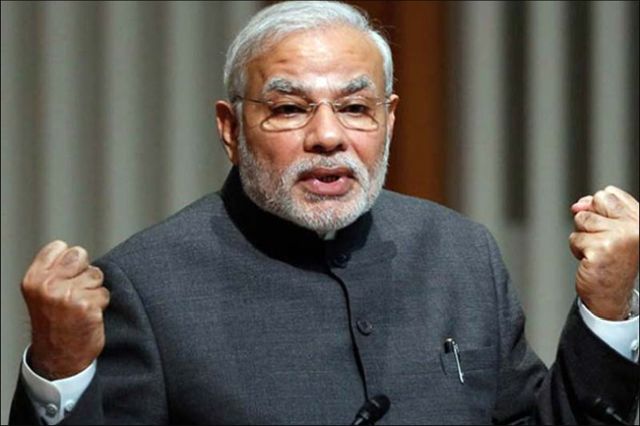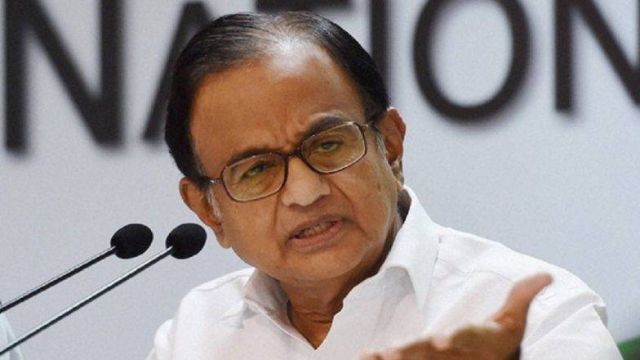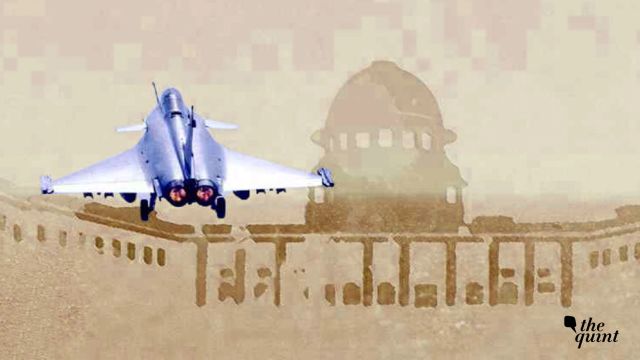
by admin | May 25, 2021 | Opinions
 By Amit Kapoor,
By Amit Kapoor,
The last four years of the Narendra Modi government have seen trajectory-altering policies and programmes covering a broad spectrum of areas, from Sagarmala targeting the waterways and coastline for enhancing port development and pushing the growth of coastal areas; to Digital India enabling online infrastructure and internet connectivity.
India is currently also undergoing a powerful wave of social and behavioural change movements, with Swachh Bharat Mission ensuring 601 open defecation free districts in 2019. This movement towards a clean India is being complemented by the ‘Eat Right India Movement’ launched by the Food Safety and Standards Authority of India (FSSAI) under the Ministry of Health and Family Welfare, with its key focus on public health and safe food.
India stands at a very crucial juncture wherein it is under the rising burden of non-communicable diseases (NCDs), with the prevalence of diabetes increased to 65 million in 2016, as per a Lancet Study.
Not only is India experiencing severe concerns of NCDs, arising out of poor diets and bad food habits, but the nation remains critical in terms of incidences of food-borne diseases, under-nutrition and micro-nutrition. In 2017, one of the major contributors to concerns of morbidity due to communicable diseases was acute diarrhoeal diseases (22 per cent).
As is visible, India’s status of health due to food-related concerns is alarming and that is why the Eat Right India movement comes as a refreshing change. The movement started off with a nation-wide campaign to reduce the intake of high salt, fat and sugar by creating a catchy ‘Aaj se Thoda kam’ tagline and to ensure food safety.
However, it is important to be wary of the fact that the problem of poor diets, bad eating habits and unsafe food remains a deeply entrenched problem across the nation, wherein a simple policy or programme would not meet the magnitude of the concern. A nation as diverse and expansive as India also continues to battle barriers of percolation of awareness to the bottom and lacks streamlined messages to alter the basic food habits. The regulations can ensure the supply of safe food, but how will the consumer demand safe food or choose food habits that are aligned with rising concerns of public health in the nation? By being aware.
This movement has attempted to resolve the demand side of food safety and public health by carrying out a nation-wide “Swasth Bharat Yatra”, the world’s biggest cyclothon for nudging the majority of the population to eat right. India, being a diverse nation with a population of 122.64 crore, there is a pertinent challenge for any movement to create a sustainable social impact.
This Yatra has had its fair share of success by covering about 20,000 km and ensuring an outreach of 2.5 crore people. The movement has had a meticulous approach in creating awareness which has involved stakeholder engagements, from poster competitions for children to Eat Right Awards for budding food businesses. The Yatra, which had been spread across a period of 100 days and ended on January 29 in New Delhi, has the potential to be scalable and replicable!
However, to throw caution to the winds, it is vital to remember that such behavioural change movements do not come with a guarantee and it is important to keep the momentum going to create a lasting social impact. So, even though the Swasth Bharat Yatra has had the buzz going on for eating safe, right and fortified, there is still a dire need to keep the pace going — to continue carrying out of such activities and events to magnify the awareness and spread the message of eating right across the nation.
A model of social and behavioural movement is not always sustainable; therefore, it is important to take into consideration that for a movement of such magnitude, the government would not be sufficient in itself and will need to enter into collaborations and partnerships.
The social impact that has been created will hold value if and only if such events are made annual, and there is devolution of responsibility to states and district food authorities to continue with the on-ground inclusive and engaging activities. Once the model is strengthened via devolution of responsibility and regularity of events, it can become a benchmark for other matters of public interest that indeed require behavioural change as a key factor for creating social and economic impact.
Such movements also need to be compatible with the nation’s socio-economic challenges, and the differing cultural, regional, social and economic challenges within the nation. Here, it is also important to see that a commercial marketing approach might crumble the potential of the movement, and a ‘social marketing’ approach should be adopted, since it affects not only the individuals but the society as a whole.
Therefore, social and behavioural movements like Swasth Bharat Yatra do have the potential to create a healthier and a more productive India if approached in the right manner!
(Amit Kapoor is chair, Institute for Competitiveness, India. The views expressed are personal. He can be contacted at amit.kapoor@competitiveness.in and tweets @kautiliya. Paramjeet Chawla, senior researcher, Institute for Competitiveness, India has contributed to the article)
—IANS

by admin | May 25, 2021 | News, Politics
 New Delhi : The Narendra Modi government is yet to take a decision on bringing an ordinance to amend the Citizenship bill after the amendment bill failed to secure parliamentary approval, Parliamentary Affairs Minister Narendra Singh Tomar said on Wednesday.
New Delhi : The Narendra Modi government is yet to take a decision on bringing an ordinance to amend the Citizenship bill after the amendment bill failed to secure parliamentary approval, Parliamentary Affairs Minister Narendra Singh Tomar said on Wednesday.
The government, however, is likely to repromulgate the triple talaq ordinance as it could not get the Muslim Women (Protection of Rights on Marriage) Bill too passed in the upper House, though Tomar refused to comment on that too.
“I cannot say anything as of now on this matter. We will think over it,” Tomar said in response to IANS query whether ordinances will be brought in place of the said bills.
The Citizenship Amendment Bill is being widely opposed, especially in the northeast where even the BJP’s allies in the NDA have taken a strong exception to the legislation that was passed by the Lok Sabha last month.
Tomar blamed the opposition for non-passage of the triple talaq bill, saying the opposition’s attitude changed as the election came nearer.
—IANS

by admin | May 25, 2021 | News, Politics
 New Delhi : India’s economy that had recovered from the damage caused by the ‘Great Recession’ of 2008, cruising at a growth rate of 7.5 per cent, has been derailed by the Modi government, says former Finance Minister P. Chidamabaram who feels that the damage done to the economy is as worrying as that done to the society.
New Delhi : India’s economy that had recovered from the damage caused by the ‘Great Recession’ of 2008, cruising at a growth rate of 7.5 per cent, has been derailed by the Modi government, says former Finance Minister P. Chidamabaram who feels that the damage done to the economy is as worrying as that done to the society.
“Everyone who brought sensible ideas to the table to turn the economy around has left the government in disgust and despair,” he says, accusing the ruling dispensation of “manufacturing statistics and asking people to eat statistics”.
He makes these observations in “Undaunted: Saving the Idea of India”, which is scheduled to be launched by former Vice President Hamid Ansari on February 8 here.
“An old civilization that has accommodated many religions, cultures, languages, communities and castes, and has tried during the last 71 years to become a modern nation, is so polarized and divided today that there is real cause to worry about its survival,” he asserts in the Introduction to the upcoming book.
He states that former Prime Minister, the late Atal Bihari Vajpayee, understood the fundamental rules of democracy and “gracefully gave up power after 13 days, again after 13 months, and once again after 5 years” but laments that “his example has been forgotten – and perhaps rubbished in private – by the swayamsevaks in power today”.
He says “every value of the Constitution is under attack” in contemporary India and fears that there is a “clear and present danger that the Constitution of India will be replaced by a document that will be inspired by an ideology called Hindutva”.
That, Chidambaram says, will be the end of the ‘idea of India’, restoring which will require another freedom struggle and another Mahatma (Gandhi).
Adds Ansari in the Foreword: “If the budget is passed without scrutiny and debate by the Parliament; and if important pieces of legislation are endorsed without reference to Standing Committees, then it is evident that the Parliament as the designated legislative institution is not doing its duty and the government of the day is failing in its primary duty…”
The book, a collection of Chidambaram’s published essays, published by Rupa, is set to be launched on Friday.
—IANS

by admin | May 25, 2021 | News, Politics
 Shillong : Normal life came to a standstill in Meghalaya on Tuesday during a dawn-to-dusk shutdown called by the North East Students Organisation (NESO) in protest against the Modi government’s move to go ahead with the Citizenship (Amendment) Bill, 2016.
Shillong : Normal life came to a standstill in Meghalaya on Tuesday during a dawn-to-dusk shutdown called by the North East Students Organisation (NESO) in protest against the Modi government’s move to go ahead with the Citizenship (Amendment) Bill, 2016.
The BJP-backed Sangma government in Meghalaya had said that it will not support the controversial Citizenship Bill that seeks to give citizenship to illegal migrants of six religious minority groups from Bangladesh, Pakistan and Afghanistan.
Almost all government establishments and educational institutions remained closed across the state. Public transport went off the roads.
“Thin attendance was recorded in government offices,” an official said.
NESO supporters blocked roads with boulders and burnt tyres in several parts of the state. There were also reports of some vehicles being vandalized.
National Highway No. 40 and 44, the lifeline for landlocked Mizoram, Tripura and parts of Manipur and Assam, were also affected by the shutdown.
“There were no reports of any major incidents from any part of the state,” Director General of Police R. Chandranathan told IANS.
“There is no confusion about our stand. We were the first state government and cabinet to come out with an official resolution that we are against the bill,” Meghalaya Chief Minister Conrad Sangma told journalists on Monday night.
Asked if the National People’s Party will put out of the BJP-led NDA government, the NPP Chief said: “We have been very clear to the NDA that this is something we will not support. We will see when the time comes, but as of now, we have made our stand clear that we are not supporting the Bill.”
—IANS

by admin | May 25, 2021 | Corporate, Corporate Governance, Corporate Reports, News, Politics
 New Delhi : A day after the Supreme Court dismissed petitions seeking a probe into the Rafale deal, the political dogfight over the issue intensified with the Congress accusing the Narendra Modi government of “misleading” the apex court that resulted in “factual bloomers” in the judgment. The opposition party demanded that the Attorney General and the Comptroller and Auditor General (CAG) be summoned by the Public Accounts Committee (PAC) of Parliament in this connection.
New Delhi : A day after the Supreme Court dismissed petitions seeking a probe into the Rafale deal, the political dogfight over the issue intensified with the Congress accusing the Narendra Modi government of “misleading” the apex court that resulted in “factual bloomers” in the judgment. The opposition party demanded that the Attorney General and the Comptroller and Auditor General (CAG) be summoned by the Public Accounts Committee (PAC) of Parliament in this connection.
The Centre’s ruling BJP, which has been touting the verdict as a “clean chit”, hit back charging the Congress with trying to sabotage the country’s security preparedness by raking up the deal again and again.
The CAG report, relying on which the Supreme Court dismissed the petitions, turned out to be the latest flashpoint over the Modi government’s decision to buy 36 French built fighters.
While the Chief Justice of India Ranjan Gogoi-led bench in the verdict said that the “pricing details have been shared with the CAG, and the report of the CAG has been examined by the Public Accounts Committee (PAC)”, the Congress maintained that “no portion of the CAG report has been placed before Parliament or placed in the public domain”.
Keeping the pot boiling, PAC Chairman and senior Congress leader Mallikarjun Kharge said he will press for summoning the Attorney General and the CAG to ask them when was the public auditor’s report tabled and when did the PAC examine it.
“The government lied in the Court that the CAG report was presented in the House and in PAC. They also told the Court that the PAC has probed it. They claimed that the report was in the public domain. Where is it,” Kharge told the media here.
He said the CAG will be questioned as to when was the report presented, when was it accepted, when was it brought to PAC, when was the evidence taken and when was it presented in Parliament.
Subsequently addressing a media conference here, Congress leader and advocate Kapil Sibal said the Supreme Court verdict had “factual bloomers” for which the Modi-led Centre was responsible.
“There are factual bloomers in the judgment for which the government is responsible and not the court. If you give wrong facts to the court and on that basis, the court makes factual assertions, in that case it’s the government which is responsible,” said Sibal.
He also asserted that the apex court was neither the right forum to examine the corruption in the deal nor the verdict was a “clean chit” for the BJP-led Centre.
“The Supreme Court is not the appropriate forum because, it cannot examine all the file notings or examine witnesses on oath including Prime Minister Narendra Modi, who needs to be questioned as also defence ministry officials.
“It is childish that the government and the BJP is claiming victory,” Sibal said ridiculing Home Minister Rajnath Singh, Finance Minister Arun Jaitley and Defence Minister Nirmala Sitharaman for their assertions that the verdict was a clean chit to the Modi government and accusing the Congress of jeopardising national security by politicising the defence deal.
“The court said that it cannot go into issues of pricing and matters relating to technical suitability of the jets, so how can the government claim that the deal is clean and there is no corruption. The court nowhere said that,” Sibal said iterating that only a Joint Parliamentary Committee (JPC) probe can unearth the “corruption and crony capitalism” in the deal.
Meanwhile, the Bharatiya Janata Party continued its attack on the Congress saying the grand old party was trying to “sabotage India’s security preparedness by raking up the Rafale deal issue, despite the Supreme Court ruling that there was no need for a probe”.
“This is nothing but sabotage of our security preparedness. We have already said that (Congress President) Rahul Gandhi owes an apology to the nation, to the defence forces and Lok Sabha also,” Union Minister for Information and Broadcasting Prakash Javadekar told the media in Panaji.
“The Supreme Court has clearly exposed the falsehood of Congress and also gave a clean chit to the deal by saying that no further enquiry was needed. Still if the Congress persists with the issue, the only conclusion is that it wants to stop the deal which will weaken the security preparedness of the country,” he added.
The Supreme Court on Friday junked the pleas seeking a court-monitored probe into the alleged financial and procedural “irregularities” in the Rafale deal, but the issue has continued to reverberate both inside and outside parliament.
—IANS





